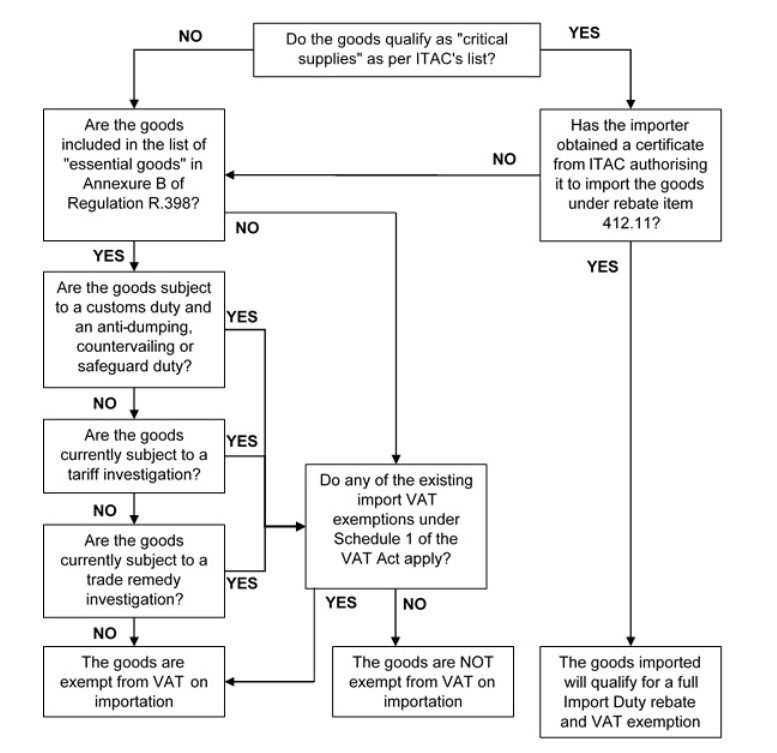Executive summary
The importation of certain goods will qualify, as summarized below, for an Import Duty rebate and/or a VAT exemption where these goods are imported for the relief of distress of persons impacted by Covid-19.
The South African Government announced, on 27 March 2020, as part of the measures it has put in place under the Disaster Management Act 57 of 2002, that the importation of “essential goods” as defined in Annexure B of Regulation R.398 of the Government Gazette No 43148 of 25 March 2020 may qualify for such relief.
Since then the South African Revenue Service (SARS) and the International Trade Administration Commission (ITAC) have clarified which goods qualify for the Value-Added Tax (VAT) exemption and which goods qualify for an Import Duty rebate and VAT exemption.
Detailed discussion
VAT exemption for “essential goods”
The VAT exemption on the importation of essential goods applies where the item is not already exempt from VAT on importation. For example, the importation of basic food items (the items listed under Part B of Schedule 2 of the VAT Act) has always been exempt from VAT on importation and is not impacted by the VAT exemption on importation of essential goods.
ITAC issued a certificate relating to the SARS essential goods list, whereby it certified that the goods listed in Annexure B of Regulation R.398 are goods that are imported for the relief of distress of all persons in South Africa due to the COVID-19 pandemic. These are specific goods listed under the headings Food, Cleaning and Hygiene Products, Medical, Fuel and Basic Goods. The effect of the ITAC certificate, which is valid from 30 March 2020 and will remain valid for the duration of the National Disaster, is that the importation of these essential goods will automatically qualify for the VAT exemption. However, the ITAC certificate, and therefore the VAT exemption, does not apply to the following goods:
- Goods that are subject to an ordinary customs duty and a trade remedies duty (anti-dumping, countervailing or safeguard duty).
- Goods that are currently subject to a tariff investigation.
- Goods that are currently the subject of a trade remedy investigation. These are goods that are manufactured by domestic industry and where ITAC has determined such industry is being or is likely to be injured by imports.
ITAC published schedules of goods that are currently subject to a tariff investigation or a trade remedy investigation. The importation of these goods will not qualify for the essential goods VAT exemption.
Importers trading with “essential goods” would, in the absence of the VAT exemption on these goods, most likely have been entitled to deduct the import VAT as input tax. However, such input tax deduction may only be made after the import VAT was paid to SARS Customs. By exempting the importation of essential goods from VAT, importers will no longer be required to pay the VAT on importation and then claiming an input tax deduction on a subsequent VAT return. This exemption will bring welcome cash flow relief to these traders.
Import Duty rebate and VAT exemption for “critical supplies”
The importation of critical supplies may qualify for an Import Duty rebate and a VAT exemption on the condition that ITAC issues a certificate to the importer that authorizes the importer to import under rebate item 412.11.
A list of products that are considered to be critical supplies is available on ITAC’s website. The list is not exhaustive and may be amended by ITAC from time to time. At the time of publishing this Alert, the list included items under the following broad categories:
- COVID-19 test kits and apparatus used in Diagnostic Tests
- Protective garments and similar items
- Thermometers
- Disinfectants/sterilization products
- Other medical devices
- Medical consumables
- Immune boosters
To qualify for an ITAC certificate, the importer must be registered with SARS customs as an importer and must be registered with CIPC (Companies and Intellectual Property Commission). Applications for the certificate may be submitted to ITAC by email and ITAC estimates that applications will be processed within 24 to 48 hours.
The goods imported under this rebate item may not be sold or disposed of to any party who is not entitled to any privileges under the item, or removed to Botswana, Lesotho, Namibia or eSwatini without ITAC’s permission. The relief will also only apply to direct imports and not to goods to be cleared into bond. The ITAC certificate will also not be transferrable between entities.
The period during which the importer may import critical supplies under this rebate item will be specified in the ITAC certificate.
The following diagram is a guide to determine if the importation of specific goods will qualify for an import duty rebate and/or VAT exemption:

For additional information with respect to this Alert, please contact the following:
Ernst & Young Advisory Services (Pty) Ltd., Johannesburg
- Leon Oosthuizen
- Johnathan Fillis
Ernst & Young Advisory Services (Pty) Ltd., Cape Town
- Redge de Swardt

